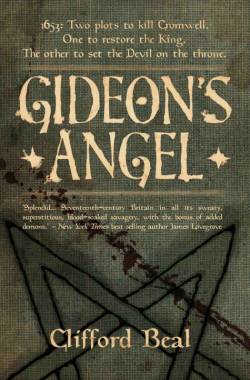
Writing Gideon’s Angel
Just what the hell was I thinking about? I had a straightforward outline for a historical novel set during Oliver Cromwell’s republic in mid-17th century England. It was to be a thriller—a la Frederick Forsyth—in which a disgruntled Royalist officer in exile returns to assassinate the Lord Protector in his own rogue operation. But someone (and you know who you are) put a flea in my ear. Why not, they said, inject a supernatural element into this plot to add a whole new level of interest? After all, magic was not unheard of in this era nor was it unusual for superstitious beliefs to co-exist with puritanical godliness.
Now, as sceptical as I was, I did not dismiss this notion out of hand. After all, reeling back to my days of misspent youth, when I was not engaging in underage drinking I was devouring genre fiction everywhere I could get it. Sword & sorcery, epic fantasy, Lovecraftian horror, space opera. You name it and I was shelling out 95 cents for a paperback down at College Hill Bookshop in Providence. My first forays into creative writing also involved horror or fantasy (trope-laden as they were replete with requisite diminutive folk and magic swords). So, upon reflection, the idea of injecting the fantastical into my historical novel became more and more appealing. A way I could satisfy both itches as it were.
So, Gideon’s Angel took a hard left turn, waved good-bye to Dumas, Bernard Cornwell and Patrick O’Brian, and entered the realm of historical fantasy. And if truth be told, I had already written a manuscript several years earlier with the same lead character, Colonel Richard Treadwell, in which this very unreliable narrator tells us that he sees the dead with alarming frequency while he fights in a horrific war in northern Germany in the 1620s.. The trouble is, no one else sees what he is seeing. The reader is left to decide whether he’s clairvoyant or just barking mad. Now, with Gideon’s Angel, a direct sequel, I could nail my colours to the mast and bring not just Colonel Treadwell but his comrades too, face-to-face with the demonic.
I hugely enjoyed writing Gideon’s Angel and letting the reader share in the knowledge of the otherworldly threat that Treadwell and his friends have to combat while trying to convince others to help them. Because in the novel, whether the characters believe it or not, demons do exist in the backstreets of London town and they’re the advance guard of an “end of days” occupation. I also had great fun injecting real people—famous or infamous—into the story whether they are d’Artagnan, John Milton or Cardinal Mazarin, and making them part of the “conspiracy”. Although these two novels form a duology, I’d love to return to Treadwell at some point in the future. Both are written such that one does not need a knowledge of the time period to enjoy them and the reader is given just enough background to float the story being told. So no worries if you failed A-level English history. Here’s your second chance.
While the Colonel takes his well-deserved rest, I’ve moved on to writing an epic fantasy series for Solaris that debuts next February. The first book is called The Guns of Ivrea, set in a world with similarities to our own renaissance Italy—but with mermen. And basilisks. Think of it as the sort of epic fantasy that Cesare Borgia or Leonardo daVinci might have written if they were into genre fiction. Ah, I can already hear the sails snapping taut on the spars and smell the salt tang of the azure sea …
Order: UK | US | DRM-free eBook